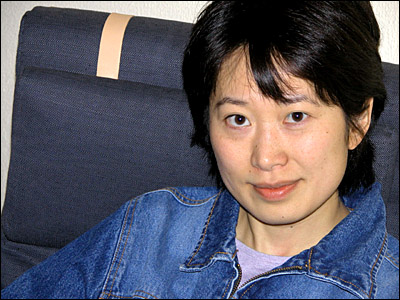 |
||
|
|

|
|
Korean Adoptees Remember |
||
|
Moving Home
Trenka will be writing and editing two book projects while she's there, and The Language of Blood is just coming out in the Korean edition. American RadioWorks asked her to keep an audio diary of her first few months in Korea. She records her thoughts sitting in her small rented room, and makes recordings on the streets of Seoul. But the issue of adoption is never far from her mind. She records this entry on June 24, 2005:
Trenka says she's making a new life for herself in Korea. By day she writes, teaches English, and learns to speak her mother tongue. But at night, she dreams of America. Susan Cox of Holt International has a different take on adoption. Cox was adopted from Korea 16 years before Trenka. Cox accepts that as a mixed-race child, she could not have remained with her mother. She says her mother tried to dye her brown hair blue-black to make her blend in, but finally placed her in the Inchon orphanage where she stayed until Holt took her to America. For Cox, adoption saved her from an orphanage life. "The very first time I went back to Korea I was 24 years old," Cox says. "I went back to ... the Holt orphanage and …I had the opportunity to meet people who were my age that for whatever reason they had not been adopted and they were still at the orphanage. And how different our lives were! And not because I'd gone to America, but because I'd gone to a family." Cox says she has married, had children and done work that is meaningful to her. She credits her successes to growing up in a family. Despite her happy experience being adopted, Cox was curious about her birth family. She eventually placed an ad in a Korean newspaper and located two half-brothers in Korea. She learned her mother had died. "My younger brother who was with our mother when she died said the last words she ever spoke were, 'You have an older sister, and she went to America,'" Cox says. She says that to know that she was the last thing her mother thought of or spoke of is "a gift beyond measure." But, Cox says, "The sadness of that is also overwhelming. To know her whole life I was her secret. That she worried about me, that she thought of me, that's the bittersweet." For thousands of children, says Cox, the only family they'll ever be a part of is through inter-country adoption. Korea popularized international adoption, but it's no longer the main sending country. At the Seoul Olympics in 1988, Korea was publicly embarrassed by suggestions it had produced its economic miracle by sending its poor children away. At that time between 7,000 and 8,000 children were leaving every year. Leaders pledged to promote domestic adoption instead. Today, about 1,700 Korean children are adopted in the United States each year, only surpassed by China, Russia and Guatemala. |
||
|



